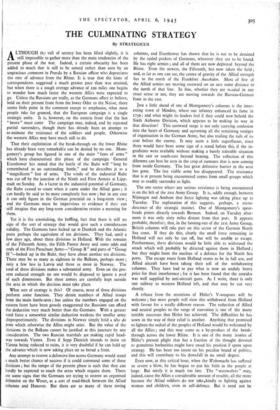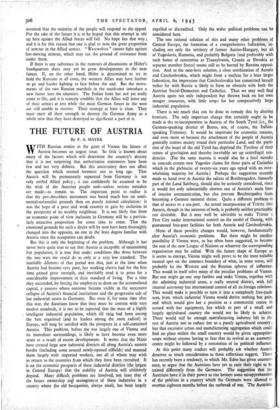THE CULMINATING STRATEGY
By STRATEGICUS
ALTHOUGH thz veil of secrecy has been lifted slightly, it is still impossible to gather more than the main tendencies of the present phase of the war. Indeed, a certain obscurity has been added to much that is still to be sensed rather than seen by an ungracious comment in Pravda by a Russian officer who depreciates
the rate of advance from the Rhine. It is true that the hints of correspondents suggested a much greater pace than was attained, but when there is a rough average advance of too miles one begins to wonder how much faster the western Allies were expected to go. Unless the Russians are really, as the Germans affect to believe, held on their present front from the lower Oder to the Neisse, there seems little point in the comment except to emphasise, what most people take for granted, that the European campaign is a single strategic unity. It is, however, on the eastern front that the last " heave " must come. The campaign may, indeed, end by repeated partial surrenders, though there has already been an attempt to re-animate the resistance of the soldiers and people. Otherwise the western Allies may have much still to do.
That their exploitation of the break-through on the lower Rhine has already been very remarkab:e can be denied by no one. Mont- gomery's group has figured in one of the main " feats of arms " which have characterised this phase of the campaign. General Eisenhower has stated that the battle of the Ruhr will " long be remembered as an outstanding battle," and he describes it as a " magnificent " feat of arms. The whole of the industrial Ruhr was cut off by the junction of the Ninth and First Armies at Lipp- stadt on Sunday. As a factor in the industrial potential of Germany, the Ruhr ceased to count when it came under the Allied guns ; it can hardly be said to be more completely lost now ; but in any case it can only figure in the German potential on a long-term view ; and the Germans must be impervious to evidence if they can still imagine that any long-term consideration retains a meaning for them.
Yet it is the astonishing, the baffling, fact that there is still no sign of the sort of strategy that would give such a consideration validity. The Germans have locked up at Dunkirk and the Atlantic ports perhaps the equivalent of ten divisions. They had, until a few days ago, about three divisions in Holland. With the remains . of the Fifteenth Army, the Fifth Panzer Army and some odds and ends of the First Parachute Army—" Group B" and parts of "Group H "—locked up in the Ruhr, they have about another ten divisions. There may be as many as eighteen in the Balkans, perhaps more ; only a few less in Latvia and three of more in Norway. The total of these divisions makes a substantial army. Even on the pre- sent reduced strength no one would be disposed to ignore a pool of such dimensions. But these armies are carefully kept outside the area in which the decision must take place.
What sort of strategy is this? Of course, most of these divisions perform some function. They detain numbers of Allied troops from the main battle-area ; but unless the numbers engaged on the eastern front have been grossly exaggerated the Russians can afford the deduction very much better than the Germans. With a greater total force a somewhat similar deduction weakens the smaller army disproportionately. The divisions in Norway simply hold a tete de Pont which otherwise the Allies might seize. But the value of the divisions in the Balkans cannot be justified at this juncture by any consideration. The two Russian marshals are making rapid head- way towards Vienna. Even if Sepp Dietrich intends to insist on Vienna being reduced to ruins, it is very doubtful if he can hold up the advance-which is now taking place on so broad a front.
Any attempt to restore a defensive line across Germany would stand a much better chance of success if it could command some of these divisions ; but the tempo of the present phase is such that they can hardly be expected to reach the areas which require them. There are some- signs than the Germans are trying to restore an organised defensive on the Weser, as a sort of road-block between the Allied columns and Hanover. But there are so many of these roving columns, and Eisenhower has shown that he is not to be detained by the sealed pockets of Germans, wherever they are to be found. He has eight armies ; and all of them are now deployed beyond the Rhine. Even the newest, the Fifteenth, has now taken the field ; and, as far as one can see, the centre of gravity of the Allied strength lies to the north of the Frankfort Autobahn. Most of five of the Allied armies are moving eastward on an axis some distance to the north of that line. In fine, whether they are needed in any exact sense or not, they are moving towards the Russian-German front in the east.
rust a little ahead of one of Montgomery's columns is the inter- esting town of Minden, where our infantry enhanced its fame in 1759 ; and what might its leaders feel if they could now behold the Sixth Airborne Division, which appears to be making its way in that direction! This eastward surge is not only carrying confusion into the heart of Germany and uprooting all the remaining vestiges of organisation in the German Army, but also trailing the tails of its coat before the enemy. It may seem a little superfluous, since there would have been some sign of a stand before this if the in- gredients were available without making a barely tolerable situation in the east or south-east beyond bearing. The reflection of this dilemma can best be seen in the crop of rumours that is now coming from inside Germany. The last great defensive barrier in the west has gone. The last viable army has disappeared. The resistance that is at present being encountered comes from small groups which may as readily surrender as fight.
The one sector where any serious resistance is being encountered is on the left of the 21st Army Group. It is, oddly enough, between Nijmegen and Arnhem that fierce fighting was taking place up to Tuesday. The explanation of this suggests, perhaps, a recru- descence of the strategic instinct. One of Montgomery's spear- heads points directly towards Bremen. Indeed, on Tuesday after- noon it was only sixty miles distant from that port. It appears probable, therefore, that, in the fanning-out of the 21st Army Group, British columns will take part on this sector of the German North Sea coast. If they do this, clearly the small force remaining in Holland will not only be cut off, but will be unable to escape. Furthermore, three divisions would be little able to withstand the attack which will probably be directed against them in Holland ; but they might form the nucleus of a defence for the North Sea ports. The escape route from Holland seems to be in full use, and Allied aircraft have been taking their toll of the withdrawing columns. They have had to pay what is now an unduly heavy price for their interference ; for it has been found that the corridor was well supplied by anti-aircraft guns. As I write, there is only one railway to western Holland left, and that may be cut very shortly.
A release front the attentions of Hitler's V-weapons will be welcome ; but most people will view this withdrawal from Holland with favour for a totally different reason. The reduction of Allied and neutral peoples to the verge of starvation is one of the many terrible successes that Hitler has achieved. The difficulties he has sown in the way of their relief is another. Anything that promised to lighten the ordeal of the peoples of Holland would be welcomed by all the Allies ; and this may come as a by-product of the break- through across the lower Rhine. It is one of the many ironies of Hitler's present plight that but a fraction of the thought devoted to gratuitous barbarities might have eased his position if spent upon strategy. He has been too intent on his peculiar brand of politics, and this will contribute to his downfall in no small degree.
Even now, at this critical hour, when the Wehrmacht has suffered so severe a blow, he has begun to put his faith in the people at large. But surely it is much too late.. The " werewolves " may, indeed, cause the Allies a considerable amount of trouble, all the more because the Allied soldiers do not take.kindly to fighting against women and children, even in self-defence. But it need not be
assumed that the majority of the people will respond to the appeal. For the sake of the future it is to be hoped that this attempt to stir up hate against the Allied forces will fail. No hope lies that way ; and it is for this reason that one is glad to note the great proportion of armour in the Allied armies. " Werewolves " cannot fight against fast-moving armour, which may cut the ground of resistance from under them.
If there is any substance in the rumours of dissensions at Hitler's headquarters there may yet be great developments in the near future. If, on the other hand, Hitler is determined to try to hold the Russians at all costs, the western Allies may have further to go and harder fighting to face before the end. But the move- ments of the two Russian marshals in the south-east introduce a new factor into the situation. The Italian front has not yet really come to life, and it is scarcely credible that the Allies will leave any of their armies at rest while the main German forces in the west are still unable to recover. Their strategy at least is clear. They must exert all their strength to destroy the German Army as a whole now that they have destroyed so significant a part of it.



























 Previous page
Previous page